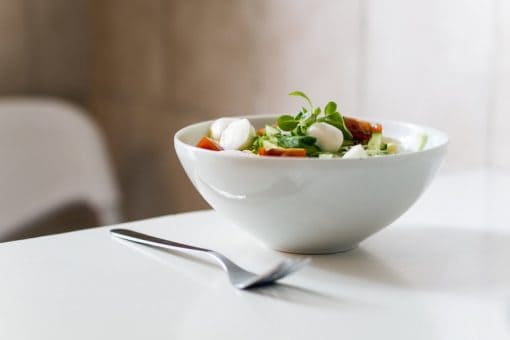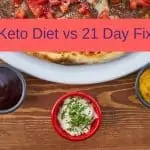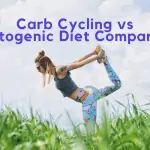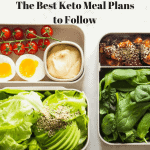When embarking on the journey to reach your fitness goals many people wonder if it’s possible to burn fat while building muscle. The answer is YES! Both of these objectives can be achieved at the same time by implementing the simple equation below:
Healthful diet + Exercise + Supplements = Less Fat, More Muscle
Let’s break down each section.
Topic Contents
Healthful diet:
Following a healthful diet is the most important part of this equation. No amount of exercise or supplementation can outweigh poor eating habits. Therefore, it is critically important to examine your diet and make changes if necessary if you want to lose fat and gain muscle.
The basis of a healthy eating pattern includes eating a variety of nutrient-rich foods every day. I recommend a diet high in fruits, vegetables, whole grains, healthy fats and animal and plant-based proteins. It’s important to limit processed foods as they are often filled with sugar, fat, and salt. Also, opt for water over caloric beverages.
Keep in mind that one pound of fat is equal to 3,500 calories. Therefore, to lose one pound of fat you must create a deficit of 3,500 calories through diet and or exercise.
Exercise:
Exercise is the perfect complement to a healthy diet. There are two types you must do in order to burn fat and gain muscle: aerobic and strength training.
Maximum fat loss is achieved through moderate aerobic exercise. In fact, the highest levels of fat burning occur between 25-60% of maximum oxygen consumption. At higher intensities, fat burning is slowed down as the body favors to break down carbohydrates over fat for energy, resulting in a lower rate of fat loss. Examples of moderate aerobic activity include brisk walking, jogging, running, swimming, using the elliptical, tennis and walking uphill.
Building muscle mass is best achieved through strength training. Muscle growth happens when the rate of muscle protein synthesis is greater than the rate of muscle protein breakdown. This means you want to be building more muscle than you are breaking down in order to gain lean muscle mass. Strength training achieves this by exerting pressure on your muscles and causing small tears that need to be repaired. After a strength training session, your body gets to work to repair these tears by generating new muscle fibers. This continuous process of tearing and rebuilding muscles leads to increased muscle mass over time. However, in order for your body to make these repairs, they need access to protein, which is why it’s important to consume protein from a food source or a supplement after you finish a workout. More on this later. Examples of strength training include: lifting weights, squats, push-ups and climbing stairs.
So, how much exercise should you be doing every day? I recommend working up to 30 minutes of moderate aerobic exercise 3x a week and 45 minutes of strength training 2x a week. This combination of aerobic and strength training will lead to maximum fat loss and muscle growth.
Supplements:
Studies have shown that using protein supplements can help increase lean muscle mass. In order to gain muscle mass, you must consume more protein than is normally broken down by your body every day. This is where adding a protein supplement after working out can make a big difference. It’s an easy and convenient way to add large amounts of high-quality protein to your diet. It’s especially effective if you following a lower calorie diet for weight loss because when you cut calories you end up consuming less protein. A protein supplement is great because it will help you meet your protein needs without adding a lot of extra calories.
I recommend adding a protein supplement after every workout. For top muscle protein synthesis between 15-25g of protein is recommended within 2 hours of exercise by the American College of Sports and Medicine. Consuming whole foods with this amount of protein after a workout is also an option. For example, a greek yogurt usually contains between 15- 20g of protein.
How much protein is recommended for someone who is trying to gain muscle mass? It’s best to aim for 1.2-2g of protein per kg of body weight per day.
Supplements that claim they help you burn fat should be avoided as there is no research to back up these claims. Most of the time they are filled with caffeine which can lead to many unpleasant side effects. Remember, no supplement has been shown to be more effective than an improved diet and increased exercise.
So, what should you look for in a protein supplement to support muscle growth? My rules of thumb outlined below:
- 20g protein per serving: This is the amount needed to achieve maximum results within two hours of working out. Look for a protein with around 20g of protein per serving to support your objectives.
- 120 calories: Look for a protein supplement with 120 calories or less per serving. Each gram of protein has 4 calories so if your buying a protein with 20g per serving that is 80 calories. A supplement will only have more calories than this if there are other added ingredients. I recommend keeping supplements as simple as possible and adding additional calories from nutrient dense food sources.
- A short list of ingredients: Keep the ingredient list as short as possible. Protein isolates by themselves are clean, however, companies often add other ingredients for thickness, texture, blendability, and flavor. These food additive ingredients are highly processed and should be avoided when possible.
- Organic and Non-GMO: Choosing products with the organic and non-GMO certified label ensures you are consuming the highest quality products.
- No Artificial Sweeteners: Artificial sweeteners are hundreds of times sweeter than regular sugar which can lead to sugar cravings (something you want to avoid when trying to lose weight!) They also can cause bloating, diarrhea, gas, and regular use has been linked to increased risk of chronic disease.
- Say No to Soy: I recommend avoiding any product containing soy or soy protein isolates unless its organic because of the highly chemical nature of soy processing in the U.S and high levels of pesticide residue found within our soy supply.
- Free of artificial coloring: Artificial colorants have been linked to adverse health effects and should be avoided.
- No carrageenan: Carrageenan is a type of seaweed that is used to emulsify packaged foods. It has been linked to inflammation, bloating and other digestive problems. It’s commonly found in protein drinks and I recommended avoiding.
The supplement market is unregulated and therefore, it is essential to get your supplement advice from reputable sources. As a registered dietitian, I carefully review supplements to analyze ingredients and ensure their effectiveness based on evidence-based research before recommending specific brands. I also cross-check my recommendations with Consumer Labs, the leading providers of independent test results to ensure that the ingredient claims and amounts advertised on the labels are accurate.
My top 3 recommended supplements to support a healthy weight and build lean muscle mass are included below:
1. MyProtein Impact Whey Isolate:
This is a no-nonsense whey protein powder. I like that the only ingredient is whey protein and that one serving contains 22 grams of protein. There is no flavor or sweetness and it mixes into liquids evenly. It can be mixed into smoothies, yogurt, soup, milk or just plain water. Since it is dairy based it provides 25-36% of daily needs for calcium (depending on your gender) and therefore will help support bone health.
Please note caution should be taken when selecting whey based protein powders for people who are lactose intolerant as it may cause gastrointestinal problems such as bloating, gas and diarrhea. My next two recommendations are dairy-free and appropriate for anyone with dairy intolerance or allergies.
Buy on Amazon2. NOW Sports Pea Protein- Natural Unflavored
This protein contains only one ingredient, non-GMO yellow peas and one serving size packs in 24g of protein. Pea protein is one of the latest trends in protein supplementation and for good reason. Pea protein is made by isolating the protein from yellow peas. It contains all 9 essential amino acids (EAA) which cannot be made by the body and must be consumed through food. It is an excellent source of branched chain amino acids (BCAA) which promote muscle growth. Pea protein is also a great source of iron. This particular supplement provides ~30% of daily needs for premenopausal women and ~60% for men and postmenopausal women. While animal proteins are more easily digested than plant-based proteins, research shows that pea protein is one of the easiest plant-based protein to digest. Recent studies have even found that pea protein is more effective than whey protein in increasing muscle thickness. Finally, since it is plant based this protein powder is suitable for both vegetarians and vegans.
Buy on Amazon3. Amazing Grass Protein Superfood
I love this supplement because it offers so much more than just protein. One serving contains 20g of protein from organic pea, quinoa, hemp and chia seeds. It also contains 2 servings of fruits and vegetables and 6g of fiber. It is certified USDA organic, non-GMO, gluten-free, dairy-free and grain-free as well as vegan. It’s a good source of potassium, iron, and calcium. It mixes well into liquid or smoothies and has a mild, yet smooth vegetable taste.
Amazing Grass Protein Superfood: Vegan Protein PowdeMedical disclaimer: Always consult your physician before beginning any exercise program or adding supplements to your diet.
Isabelle Bertolami MS RDN is a Registered Dietitian Nutritionist with a Master’s in Clinical Nutrition from New York University. She is a freelance nutrition writer and runs an online nutrition counseling practice. Using evidence-based research and a personalized nutrition approach Isabelle helps her clients reach their health objectives. Isabelle is no longer in the US. Currently, she lives in Paris, France, and spends her free time whipping up new healthy recipes and eating her way through France. You can see what’s on her plate at @eatwithisabelle.









